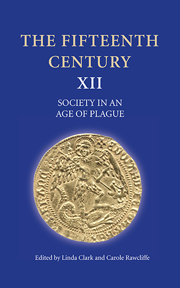Book contents
- Frontmatter
- Contents
- List of Illustrations
- Contributors
- Preface
- Abbreviations
- Introduction
- Looking for Yersinia Pestis: Scientists, Historians and the Black Death
- Pestilence and Poetry: John Lydgate's Danse Macabre
- Pilgrimage in ‘an Age of Plague’: Seeking Canterbury's ‘hooly blisful martir’ in 1420 and 1470
- An Urban Environment: Norwich in the Fifteenth Century
- Mid-Level Officials in Fifteenth-Century Norwich
- Leprosy and Public Health in Late Medieval Rouen
- Plague Ordinances and the Management of Infectious Diseases in Northern French Towns, c.1450–c.1560
- The Renaissance Invention of Quarantine
- Coping with Epidemics in Renaissance Italy: Plague and the Great Pox
- The Historian and the Laboratory: The Black Death Disease
- Index
- CONTENTS OF PREVIOUS VOLUMES
Mid-Level Officials in Fifteenth-Century Norwich
Published online by Cambridge University Press: 05 September 2013
- Frontmatter
- Contents
- List of Illustrations
- Contributors
- Preface
- Abbreviations
- Introduction
- Looking for Yersinia Pestis: Scientists, Historians and the Black Death
- Pestilence and Poetry: John Lydgate's Danse Macabre
- Pilgrimage in ‘an Age of Plague’: Seeking Canterbury's ‘hooly blisful martir’ in 1420 and 1470
- An Urban Environment: Norwich in the Fifteenth Century
- Mid-Level Officials in Fifteenth-Century Norwich
- Leprosy and Public Health in Late Medieval Rouen
- Plague Ordinances and the Management of Infectious Diseases in Northern French Towns, c.1450–c.1560
- The Renaissance Invention of Quarantine
- Coping with Epidemics in Renaissance Italy: Plague and the Great Pox
- The Historian and the Laboratory: The Black Death Disease
- Index
- CONTENTS OF PREVIOUS VOLUMES
Summary
John Clement, a brewer, entered the Norwich franchise in 1447. Over the next decade he was a constable nine times and a tax collector once, but he never discharged any other civic office. In spite of their important role in administering and maintaining order in English cities, men like Clement have been neglected as a result of English urban historians' tendency to focus on the better-documented and wealthier mercantile elite. Prosopographical analyses of urban political, economic, and social groups have directed some attention towards middling artisans and retailers because of their focus on collective biography, but the relative dearth of information about these groups has made even this approach more effective for understanding the senior officials. Moreover, although these studies have revealed much about civic hierarchies, they have perhaps encouraged the perception that a mercantile elite dominated all aspects of urban political life. Although no one would deny the virtual monopoly of high office by a privileged few, there is considerable evidence that mercantile control was not so comprehensive in the lower levels of civic government.
Non-elite urban officials have received little sustained analysis. Indeed, on the few occasions that mid-level offices have been examined they have generally been cast as part of the cursus honorum or as unwelcome chores rather than as potentially valuable positions. By focusing on a group of non-elite personnel, namely, constables, assessors, collectors, supervisors and searchers in Norwich between 1414 and 1473, this paper demonstrates the essential role played by such individuals and postulates that not all urban office-holders nursed greater ambitions.
- Type
- Chapter
- Information
- The Fifteenth Century XIISociety in an Age of Plague, pp. 101 - 122Publisher: Boydell & BrewerPrint publication year: 2013

